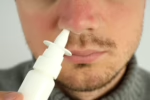Breaking the Cycle: Understanding Nasal Spray Dependency

Nasal sprays are a common remedy for congestion caused by colds, allergies, or sinus infections. While they provide quick relief, overusing certain types of nasal sprays can lead to dependency and a condition known as nasal spray addiction. Although not an addiction in the traditional sense, this dependency can significantly affect your health and quality of life.
The Path to Dependency: How Nasal Spray Addiction Begins
Nasal spray addiction often stems from a phenomenon called rebound congestion, which occurs with the prolonged use of decongestant sprays. Decongestant sprays, such as those containing oxymetazoline or phenylephrine, work by shrinking swollen blood vessels in the nasal passages, providing instant relief. However, using these sprays for more than three consecutive days can cause your nasal tissues to become reliant on the medication. Once the spray wears off, the congestion can return more severely, prompting continued use.
This cycle of dependency creates a feedback loop, making it difficult to stop without experiencing intense congestion and discomfort.
The Hidden Dangers of Overusing Nasal Sprays
While nasal spray addiction might not carry the same dangers as substance use disorders, it can have serious health implications if left unaddressed. Common risks include:
- Chronic Congestion: Prolonged use of decongestant sprays can worsen congestion over time.
- Nasal Tissue Damage: Overuse can damage the delicate tissues in your nasal passages, leading to irritation, dryness or nosebleeds.
- Reduced Effectiveness: Your body may develop a tolerance to the medication, requiring higher doses for the same relief.
- Mental Health Impacts: Dependence on nasal sprays can cause anxiety about being unable to breathe comfortably without them.
Red Flags: Recognizing Nasal Spray Dependency
Recognizing the signs of nasal spray addiction is essential to address the issue early. Common indicators include:
- Using nasal sprays multiple times a day for longer than recommended
- Feeling unable to breathe without using the spray
- Experiencing severe congestion when you attempt to stop using the spray
- Carrying nasal spray with you at all times, even when symptoms are minimal
- Noticing a decline in the spray’s effectiveness over time
Steps to Freedom: Overcoming Nasal Spray Addiction
Overcoming nasal spray addiction is possible with the right approach and support. Here are steps you can take:
- Switch to Saline Sprays: Saline nasal sprays are a safer, non-addictive alternative that can help relieve congestion without causing dependency.
- Gradual Reduction: Slowly reducing your use of decongestant sprays can help minimize withdrawal symptoms like rebound congestion.
- Consult a Healthcare Professional: A doctor can recommend treatments, such as nasal corticosteroids or antihistamines, to manage congestion and reduce reliance on decongestants.
- Practice Patience: It can take several days to weeks for your nasal tissues to heal and return to normal function. Staying committed is key.
Eye-Opening Statistics About Nasal Spray Addiction
Nasal spray addiction is more common than many people realize. Here are some key statistics that shed light on the issue:
- Studies suggest that up to 10% of nasal spray users may develop rebound congestion and dependency due to overuse.
- Decongestant sprays are among the most commonly misused over-the-counter medications in the U.S., with an estimated 6 million Americans using them excessively.
- Surveys indicate that 30-40% of people who experience chronic nasal issues admit to overusing nasal sprays as a coping mechanism.
- Many individuals are unaware of the three-day usage guideline for decongestant sprays, which can lead to unintentional overuse and dependency.
Breathe Easy: A Path to Recovery
Nasal spray addiction can disrupt your life and impact your health, but recovery is possible. By recognizing the signs, understanding the risks and staying informed about its prevalence, you can break the cycle of dependency and breathe freely again.
If you’re struggling with nasal spray addiction or any other dependency, reaching out for help can make all the difference. Take the first step today toward a healthier, happier future.
For more information, visit Silvermist or call us to speak with a professional.






